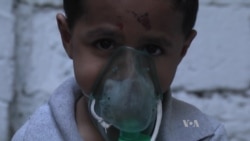In a dark, damp backyard of an apartment block in the Turkish city of Gaziantep, 60 kilometers from the Syrian border, Samar Shekho straps a ventilator over the nose and mouth of her five-year-old son, Ali. He suffers from asthma and needs the machine to help him breathe.
Samar fled her home in Aleppo four months ago with Ali and his cousin, as Russian and Syrian government forces intensified airstrikes on the rebel-held city. Ali’s father paid a smuggler to help them flee to Turkey.
"My husband wanted to come to Turkey too, but it is too expensive, so he could only send me here. The border is closed and the smugglers want a lot of money," Samar said.
Syrian families fleeing the civil war are being divided, as Turkey has tightened border controls to stem the flow of refugees.
Many families do not travel together, but instead send family members a few at a time. Those left behind have become trapped.
Turkish officials say travelers carrying the right papers, and those who are injured, are allowed through. Officials in Ankara say they are under pressure to tighten controls following the migrant deal with Europe, under which all irregular migrants arriving in Greece are to be returned to Turkey.
Samar's brother, Majid, was the first to escape to Turkey 18 months ago. He had been supporting the family through his job at a local clothing factory, but says the work has dried up.
"There are many Syrians here, and it was especially difficult in the beginning,” he said. “I learned some skills, but there is very little work here and it is difficult finding a job. I am looking. I hope I can find something."
Without any family income, life is getting tougher. Ali's ventilator only works properly if the correct medicine is added, but his mother can barely afford the electricity to run it, let alone the medicine.
"Everything is expensive here," she said. "I want to get a refugee identity card for my child that will make it easier to see a doctor, but I even need money for that. Life is difficult."
Samar's husband is trying to sell his shop in Aleppo so he can pay a smuggler and be reunited with his family. But no one wants to buy a business in a war zone.
In the meantime, Samar is dependent on handouts from sympathetic locals to help care for her children.





